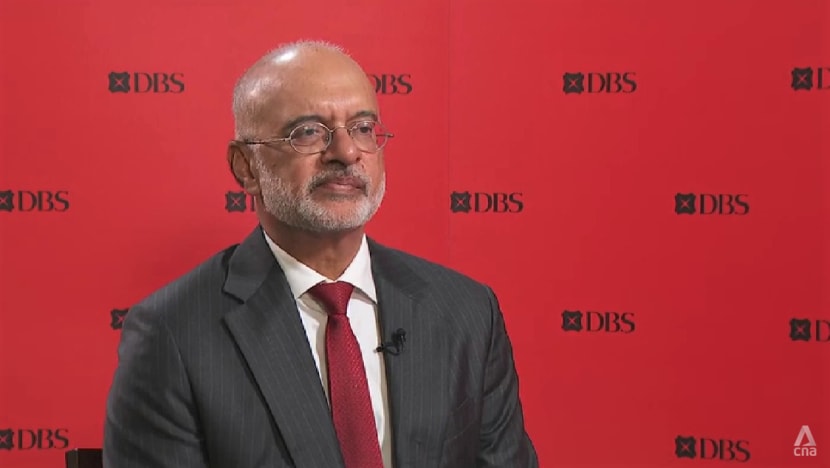‘Still early days’: DBS chief says regional outlook likely better in 2023, but global slowdown fears remain
With Singapore’s Budget 2023 to be announced on Tuesday, DBS Bank CEO Piyush Gupta hopes that the Government will continue to ensure strong social safety nets amid an uncertain inflation outlook.

SINGAPORE: The regional outlook is expected to be “a little bit better”, even as the global economy looks increasingly likely to be heading into a slowdown, said DBS Bank chief executive Piyush Gupta on Monday (Feb 13).
“Post-COVID-19 and post some of the challenges of last year, we think the macro economies are beginning to be a little bit better in our part of the world,” said Mr Gupta, adding that the United States and Europe could escape a recession.
“It's quite clear that in the West, you will see a slowdown this year. But even there, things are not going to be as bad as we originally predicted.”
The gross domestic product (GDP) of China, which has reopened up quicker than expected, could “do north of 5 per cent this year”, he told CNA’s Asia Now.
“And when China grows, then certainly all of Asia benefits, let alone the rest of the world. We think there's some upside that might come from that.”
IMPACT OF GLOBAL SLOWDOWN
“The uncertainty this year is really going to be around the impact of the global slowdown, and does it result in higher cost of credit,” said Mr Gupta. “For the time being, I'm relatively sanguine.
“I'm not seeing a lot of stress anywhere in the system or in the portfolio. But to be fair, it's still early days. We'd have to watch through the rest of the year.”
On Monday, DBS Group reported a 69 per cent rise in net profit for the fourth quarter of 2022 as higher interest rates boosted its net interest margins.
Southeast Asia's largest bank by assets said net profit in the last quarter rose to a record S$2.34 billion, from S$1.39 billion in the same period a year earlier. This is even higher than the S$2.16 billion estimated by some analysts.
DBS also recorded another new high, with earnings for the full year growing by 20 per cent to S$8.19 billion.
Last year’s record performance was largely due to the rising interest rates, noted Mr Gupta, adding that “those conditions haven’t changed very much” this year.
“The fuller impact of the interest rate increases done in the first half of 2022 will flow into this year,” he said. “And as a consequence, our earnings will continue to increase.
“We do expect our top line, therefore, to continue to have the same kind of momentum we saw last year, and similarly our bottom line, we do expect a good year.”
IS INFLATION COMING DOWN?
Some traders are betting that the United States Federal Reserve will cut interest rates by the second half of this year, but the central bank has repeatedly stated its intent to hold tight on rates until inflationary pressures have eased.
Analysts expect headline inflation to slow to 6.2 per cent in January.
“I think inflation is already coming down,” said Mr Gupta, noting that the inflation rate is likely to wind up at around 3 per cent. “In fact, the big question is do you wind up in the 2.5 to 3 range or the 3 to 3.5 range by the end of this year?
“So I think inflation will moderate. The question is really, at 3 to 3.5 per cent inflation rate, does the Fed start relenting? And I don't think that will happen.”
He believes that the US Fed, based on past experiences, will not wind back too early.
Meanwhile, many observers are expecting interest rates to peak in a target range of 5 to 5.25 per cent.
“So my personal prediction is that they will hold rates at the 5 to 5.25 per cent range, whatever they get to, and hold this pretty much there for the rest of this year,” said Mr Gupta.
Around the world, central banks have been jacking up interest rates to wage war on surging inflation.
“I suspect Asian central banks might start easing before the Fed starts easing,” said Mr Gupta.
“Because for many of the countries in Asia, the dichotomy or the dual mandate of growth and inflation is tricky. So I would not be surprised if some of the Asian central banks start easing before the Fed starts easing.”
STRONG SOCIAL SAFETY NETS
With Singapore’s Budget 2023 to be announced on Tuesday, Mr Gupta hopes that the Government will continue to ensure strong social safety nets amid an uncertain inflation outlook.
“I do think that the Government has been quite pragmatic about pushing a growth agenda, while at the same time trying to make sure that there is social harmony, so creating social safety nets around the system,” he added. “So I do expect some more goodies of that sort to trickle through the system.”
On the business front, some of the incentive structures have been helpful, said Mr Gupta. “We continue to attract a lot of wealth managers, a lot of asset management companies, because there's a very supportive policy architecture around it. So I hope to see more of that.”
On Singapore becoming a costlier place to do business, as compared to some major Asian financial hubs like Hong Kong, Mr Gupta pointed out that Asia is big enough for more than one financial centre.
“And both Hong Kong and Singapore play to our respective strengths. Hong Kong is a much bigger equity market. Singapore is a much bigger FX (foreign exchange) and commodities market, and I think we will continue to do that,” he added.
“So, as long as we are pragmatic, create the conditions for people to be able to do well and prosper, have good governance and transparency, I think we will continue to attract capital.”















